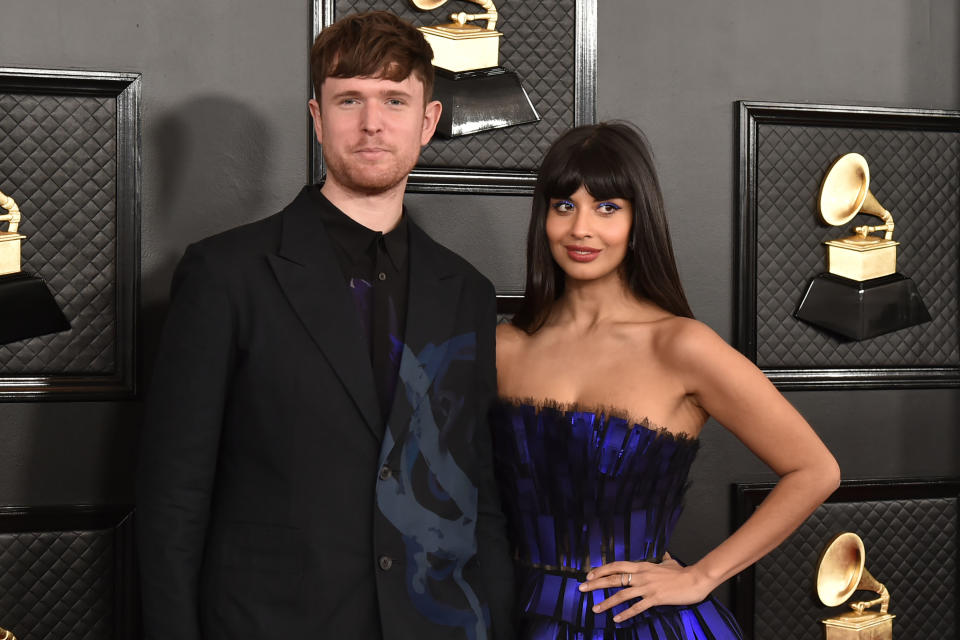Jameela Jamil has come out as 'queer.' But what does that mean?
When Jameela Jamil came out on Twitter as “queer” on Wednesday, she was aiming to quell a social media firestorm that had been ignited over news that she, a presumed-to-be-straight actress with no ties to the vogueing LGBTQ-ballroom community, had been tapped to host a new reality TV series, Legendary, focusing on that very community.
Her revelation — which she made under perceived duress, according to her tweet — prompted a range of responses, from thrilled and moved to skeptical and confused.
The confusion came mostly out of the label that Jamil chose for her self-identity: “queer.”
What does “queer” mean these days, anyway? Especially when the person who claims it is a cisgender woman openly dating a cisgender man, as is the case with Jamil, who recently attended the Grammy Awards with boyfriend James Blake.
Queer is usually the meaning of the Q at the end of LGBTQ (although sometimes it means “questioning”). According to GLAAD, queer is “an adjective used by some people, particularly younger people, whose sexual orientation is not exclusively heterosexual.”
Typically, the organization’s online glossary continues, “for those who identify as queer, the terms lesbian, gay and bisexual are perceived to be too limiting and/or fraught with cultural connotations they feel don't apply to them. Some people may use queer, or more commonly genderqueer, to describe their gender identity and/or gender expression.”

The word “queer,” originally meaning “peculiar” or “not normal,” used to be considered a pejorative term against homosexuals, starting around the late 19th century, according to the Oxford English Dictionary. But slowly, and over time, the term was reclaimed by the gay community — notably during the beginning of the AIDS epidemic, when the activist group Queer Nation adopted it. “By co-opting the word ‘queer,’ QN claims, they have disarmed homophobes,” Newsweek wrote in 1991, also making note of a new popular protest chant that’s still in use today: “We’re here, we’re queer!”
Still, notes GLAAD, while “queer has been reclaimed by some LGBT people to describe themselves,” it “is not a universally accepted term even within the LGBT community.”
The Human Rights Foundation, the country’s largest LGBTQ rights lobbying group, offers a similar definition of “queer” on its website’s glossary: “A term people often use to express fluid identities and orientations. Often used interchangeably with ‘LGBTQ.’”
And in a 2016 academic text, Teaching, Affirming, and Recognizing Trans and Gender Creative Youth: A Queer Literary Framework, by SJ Miller, “queer” is defined as “an umbrella term that many prefer, both because of convenience (easier than gay, lesbian, etc.) and because it does not force the person who uses it to choose a more specific label for their gender identity or sexual orientation.” The term also refers to “a suspension of rigid gendered and sexual orientation categories …” the glossary continues, and “embraces the freedom to move beyond, between or even away from, yet even to later return to, myriad identity categories.”
What it means precisely to Jamil, of course, is a personal matter that only she can accurately express.
But she’s not the first celebrity to identify this way. Evan Rachel Wood, back in 2013, said, “I prefer queer. ‘Bisexual’ works too, except I don't exclude transgender people. This is why labels are tricky."
Before that, in 2012, Justice League star Ezra Miller told Out magazine, “I’m queer. I have a lot of really wonderful friends who are of very different sexes and genders … That’s where I’m at in the boyfriend/girlfriend/zefriend type of question.” He elaborated for the Daily Beast, noting, “I’ve been attracted mostly to ‘shes,’ but I've been with many people and I'm open to love wherever it can be found.”
Similarly, former Grey’s Anatomy star Sara Ramirez came out while giving a speech at an LGBTQ youth conference, saying, "Because of the intersections that exist in my own life: woman, multi-racial woman, woman of color, queer, bisexual, Mexican-Irish American, immigrant, and raised by families heavily rooted in Catholicism on both my Mexican and Irish sides, I am deeply invested in projects that allow our youth's voices to be heard."
#40ToNoneSummit #SpeakingMyTruth! Will post full video of speech soon! #ThankYou @TrueColorsFund #WomanOfColor #Bisexual #Queer #Immigrant pic.twitter.com/1q8JmKih9I
— Sara Ramirez (@SaraRamirez) October 8, 2016
And then there was Sia, who, in 2013, tweeted, “I'm queer. I don't really identify as a lesbian because I've dated predominantly men. But I've certainly dated women.”
As for hearing more from Jamil about her personal use of “queer,” it could be a while, as she’s taking a hiatus from Twitter, which she called “brutal” in her tweet before noting, “This is absolutely not how I wanted it to come out.”
Read more from Yahoo Lifestyle:
Jameela Jamil says she's decided to 'adopt straight white male privilege'
Jameela Jamil calls out writer who mistook her for Priyanka Chopra: 'You can't even tell us apart'


